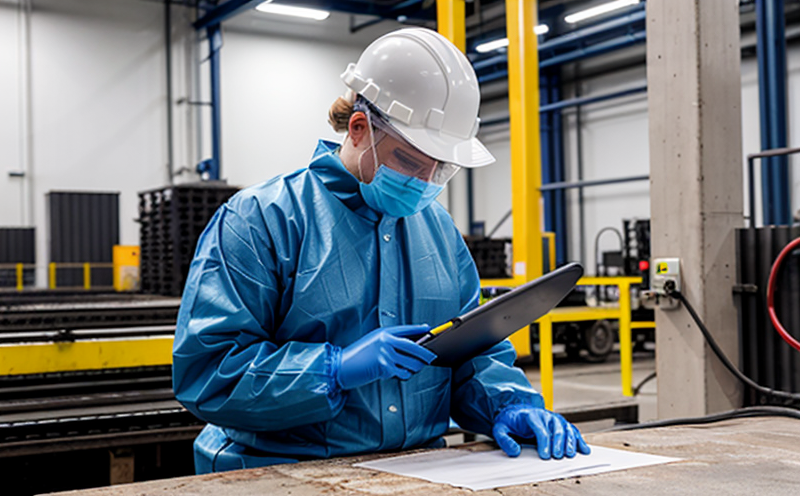ISO 13849 Functional Safety Testing of Machinery Controls Validation Method Development Test
In industrial manufacturing and processing, ensuring occupational health and safety is paramount. The ISO 13849 standard sets the stage for functional safety testing in machinery controls by providing a framework to ensure that safety-related systems function correctly under all conditions. This service focuses on the validation method development test, which is critical for compliance and peace of mind.
The process involves several steps: initial risk assessment, selection of appropriate performance levels (PLs) based on the risk assessment, design of functional safety elements, implementation, integration, testing, and finally, documentation. Each step requires meticulous attention to detail to ensure that machinery controls meet the stringent requirements set by ISO 13849.
At Eurolab, we specialize in providing comprehensive services for ISO 13849 compliance. Our team of experts works closely with clients to understand their unique needs and develop tailored solutions. From initial consultation to final validation, our process ensures that all aspects are covered comprehensively.
The functional safety testing involves a series of tests designed to verify the performance of safety-related systems under various conditions. These tests include static tests for verifying the correct functioning of electrical circuits, dynamic tests for evaluating the behavior of systems during actual operation, and simulation tests using virtual environments. Each type of test plays a crucial role in ensuring that machinery controls are safe and reliable.
Specimen preparation is an essential part of this process. Before conducting any tests, it's vital to ensure that all components are properly prepared. This includes cleaning and inspecting parts, calibrating instruments, and preparing documentation for review. Proper specimen preparation ensures accurate test results and valid conclusions.
Instrumentation plays a critical role in functional safety testing. Depending on the specific requirements of the machinery control system being tested, appropriate instrumentation must be selected. This could range from basic multimeters to complex data acquisition systems capable of capturing real-time performance metrics. The choice of instrumentation directly impacts the quality and reliability of test results.
Reporting is the final step in the process, where all findings are documented comprehensively. Detailed reports provide insights into the performance of safety-related systems under different scenarios. These reports serve as valuable tools for continuous improvement and compliance validation.
The environmental factors influencing these tests can vary widely depending on the specific machinery control being evaluated. Factors such as temperature, humidity, vibration, and electromagnetic interference (EMI) all play significant roles in determining the performance of safety-related systems. It's crucial to account for these variables during testing to ensure accurate results.
The functional safety testing process is not only about meeting regulatory requirements but also enhancing overall safety protocols within manufacturing environments. By adhering strictly to ISO 13849 standards, companies can significantly reduce the risk of accidents and injuries in their workplaces. This proactive approach fosters a safer working environment for all employees.
Why It Matters
The importance of ISO 13849 functional safety testing cannot be overstated. Compliance with this standard is essential to protect workers from potential hazards associated with machinery controls. By ensuring that these systems function safely and reliably, companies can prevent accidents, reduce downtime, and maintain high standards of quality.
- Reduces Accident Risk: Functional safety testing helps identify potential weaknesses in machinery controls before they become operational issues.
- Enhances Reliability: Rigorous testing ensures that safety-related systems perform consistently under all conditions.
- Promotes Compliance: Adhering to ISO 13849 standards demonstrates a commitment to regulatory compliance and best practices in the industry.
In conclusion, ISO 13849 functional safety testing is vital for maintaining a safe and efficient manufacturing environment. By investing in this service, companies can safeguard their operations while enhancing overall productivity and reputation.
Eurolab Advantages
At Eurolab, we pride ourselves on offering unmatched expertise and comprehensive services tailored to meet the unique needs of our clients. Our team of certified professionals ensures that every aspect of ISO 13849 functional safety testing is handled with precision and care.
- Experienced Professionals: Our experts are highly trained and experienced in all aspects of functional safety testing.
- State-of-the-Art Facilities: We have access to cutting-edge equipment that enables us to conduct thorough and accurate tests.
- Comprehensive Documentation: Every test is meticulously documented, providing clear and concise reports for review.
- Customized Solutions: Our services are tailored specifically to each client's requirements, ensuring the best possible outcomes.
We understand that every company has different needs and challenges. That's why we offer flexible solutions designed to meet your unique specifications. Let us help you achieve peace of mind knowing that your machinery controls are safely tested and validated according to ISO 13849 standards.
Environmental and Sustainability Contributions
The functional safety testing process contributes positively to both occupational health and the environment by ensuring that machinery controls operate efficiently and reliably. This, in turn, helps reduce waste and energy consumption associated with less effective systems. By preventing accidents and injuries, we also contribute to a healthier workforce and community.
- Energy Efficiency: Reliable machinery ensures optimal performance, leading to reduced energy usage and lower carbon footprints.
- Resource Conservation: Efficient operation minimizes the need for frequent replacements or repairs, conserving resources and reducing waste.
- Safety Culture: By fostering a culture of safety, we promote better working conditions and healthier lifestyles among employees.
Our commitment to sustainability extends beyond just functional safety testing. We continuously seek ways to integrate more environmentally friendly practices into our services, ensuring that we contribute positively to the global effort towards sustainable development.





